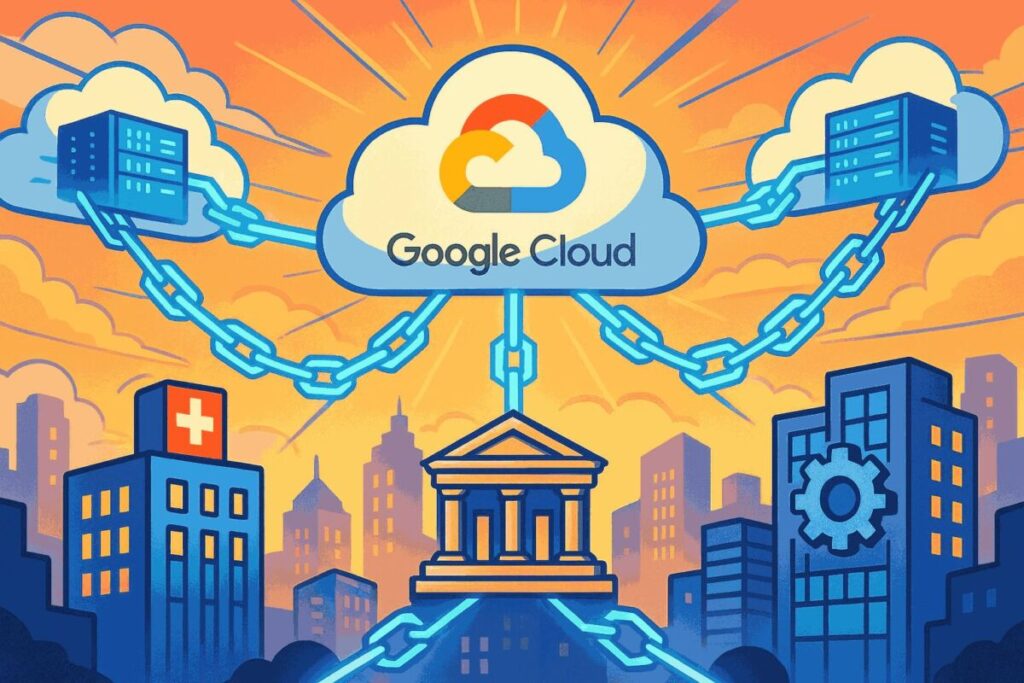
Google, as one of the largest technology companies in the world, has entered the Layer 1 blockchain space Google Cloud Universal Ledger that was previously dominated by startups and specialized companies such as Chainlink or Ethereum . This move, announced in late 2025, indicates a shift in Google’s strategy to penetrate the decentralized finance (DeFi) and blockchain space. GCUL is specifically designed for banks, financial institutions, and global markets, focusing primarily on three key areas: payments، settlements و and asset tokenization.. While the adoption of blockchain technology in traditional sectors such as banking and international trade is progressing rapidly, Google’s entry, backed by its robust cloud infrastructure, could be a turning point in the industry. In this article, I will explore the details of GCUL, its objectives, its market position, and its impact on the future of global finance.
Features and Goals of GCUL

GCUL, as a Layer 1 blockchain, provides a scalable and neutral infrastructure for financial institutions that supports smart contracts based on the Python programming language. This choice of Python, a popular language among financial developers, makes it easier for banks and companies that have previously worked with this language. The main goal is GCUL to simplify cross-border payments, enable rapid settlements, and manage digital assets while complying with KYC (Know Your Customer) regulations and international compliance. Google, utilizing the Google Cloud infrastructure, has designed its Layer 1 blockchain GCUL to carry out transactions at low cost and high speed. For example, settlements that used to take several days can now be completed in minutes or even seconds.
Another prominent feature is the support for asset tokenization. Tokenization means converting physical assets like real estate or stocks into digital tokens that are traded on the blockchain. Google, in collaboration with CME Group, the largest derivatives market in the world, has conducted tests for tokenization that show it GCUL can be applicable in real markets like futures contracts. This collaboration has increased institutional trust in this platform and shows that Google intends to turn GCUL into a new standard in finance. Additionally, GCUL, focusing on data security and compliance with regulations like GDPR, aims to address traditional banks’ concerns.
2 Competition and Position of GCUL

The entry of GCUL into the market has intensified the competition among technology giants in the blockchain space. Companies like Circle with the Arc platform and Stripe with Tempo, both working on payments and stablecoins, now face a new competitor. However, GCUL presents itself as a neutral layer that does not tie any bank or payment processor to a rival ecosystem. This neutrality is particularly attractive for institutions that want to avoid dependence on specific companies like Visa or Mastercard. For example, a European bank can use GCUL to connect to multiple exchanges without the need for intermediaries. MEXC exchange can use GCUL as an independent layer to connect to various banks and payment processors without being dependent on a specific system. This increases MEXC’s flexibility in global markets.
However, the private and licensed design of GCUL has sparked some discussions. Unlike decentralized blockchains like Bitcoin or Ethereum, where anyone can participate, GCUL only allows access to verified institutions. This has led some to say that GCUL is more of a private blockchain than a fully decentralized blockchain. However, Google is trying to attract the developer community by providing open APIs and developer tools. Competitors like Ripple which specialize in cross-border payments, may come under pressure with this new entry, but Google has a high chance of solidifying its position with strong financial and technical backing. XRP هم که تو پرداختهای برونمرزی تخصص دارن، ممکنه با این ورود جدید تحت فشار قرار بگیرن، ولی گوگل با پشتوانه مالی و فنی قوی، شانس بالایی برای تثبیت جایگاهش داره.
Impact on the Financial Future

The launch of GCUL could revolutionize the global financial infrastructure. One of its biggest advantages is the support for 24/7 settlement, which is considered a revolution in the traditional banking industry that typically operates only during business hours. Atomic Transactions also ensure that payments or settlements are either completed or entirely canceled, minimizing human errors. For example, a trader in Asia can settle instantly with a bank in the U.S. without worrying about time zone differences.
Tokenization of assets can also transform the market. Imagine being able to divide a house in Dubai into 1000 tokens, allowing anyone to buy a part of it. This increases liquidity in traditional markets and makes investment easier for ordinary people. It is predicted that by the start of full services in 2026, GCUL will be recognized as the backbone of cross-border payments and asset management. This will accelerate the adoption of blockchain in traditional sectors and create opportunities for innovation in new financial products such as digital bonds or blockchain-based insurance. However, challenges like initial implementation costs for small banks and the need for staff training also exist, which Google must pay attention to.
for the exchange MEXC exchange, this means the opportunity to list new tokenized assets and hold campaigns with greater rewards. It is predicted that by 2026, GCUL will become the backbone of cross-border payments. MEXC exchange can enhance futures and spot trading services with the integration of GCUL and bonuses like $50,000 in credit capital (like previous campaigns) can be settled more quickly.
Conclusion
Google Cloud Universal Ledger or the same ( GCUL ) by combining blockchain technology and Google’s cloud infrastructure, it has the potential to become a key player in the financial sector. This platform, focusing on payments, settlements, and tokenization, has opened a way to connect the traditional financial world with emerging technologies. Despite challenges such as centralization and public adoption, collaboration with major institutions like CME Group and compliance with regulations have heightened its chances of success. The future will show whether GCUL can establish itself as an innovative solution in financial markets or not, but Google’s entry into this space has undoubtedly injected excitement and competition into the industry. With ongoing development and partner acquisition, GCUL can impact not only financial markets but also other areas like logistics and supply chain. This is a significant opportunity for traders, banks, and developers that should be carefully monitored.
Disclaimer: The information provided in this article is not considered investment advice and should not be used as a basis for financial decision-making. Investing in cryptocurrencies carries a high level of market risk. Please trade cautiously. MEXC exchange assumes no responsibility for potential losses.
Join MEXC and Get up to $10,000 Bonus!
Sign Up


